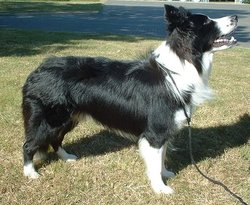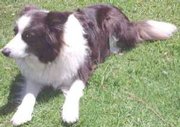Border Collie
|
|
| Border Collie | ||||||||||||||||||
|---|---|---|---|---|---|---|---|---|---|---|---|---|---|---|---|---|---|---|
| Country of origin | ||||||||||||||||||
| United Kingdom | ||||||||||||||||||
| Classification and breed standards | ||||||||||||||||||
|
A Border Collie is a hard-working herding breed of dog that originated in the border country of England and Scotland. Border Collies are noted for being affectionate with friends and reserved with strangers. Border Collies are highly intelligent herding dogs. Like most working dogs, they have a tendency towards neurotic or destructive behavior if not given enough to do. They are still frequently used on farms all over the world for assisting with the handling of livestock. Though known to be reserved with strangers, these dogs can also be protective of a human family member.
| Contents |
Appearance
Border Collies are balanced, medium-sized dogs with alert, keen expressions. Their double coats come in all colors, most commonly black and white, with other common colors being red and white, red merle, blue merle, and tricolor (black/tan/white). Eye color varies from deep brown to amber or blue with occasionally one eye of each color; kennel clubs differ on acceptable eye colors for show dogs. There are smooth-coated, short-haired, and rough-coated varieties. To be a good show dog, the dog's nose has to be the colour of the leading body colour; that is, if the dog is mostly black, the nose would have to be all black.
Temperament
Border Collies are extremely energetic and require a lot of attention. They are better off in a household that can provide them with plenty of exercise and a job to do. Like most herding breeds, they will attempt to herd family members, cats, squirrels, bicycles, cars, or anything else that moves in the absence of other charges. Border Collies make bad pets for people who cannot provide a considerable amount of daily exercise, both physical and mental. Many Border Collies end up in shelters or rescue groups because families, attracted by their appearance, discover that they cannot even begin to provide the attention and effort required for this driven, active, easily bored breed. Border Collies love to play and do not always know when to stop on their own; owners must ensure that they do not overexert themselves especially in hot weather, which can be dangerous.
Health
Hip dysplasia is widespread among purebred Border Collies. Some Border Collie breed clubs are active in promoting research into hereditary diseases of this breed.
History
Breed standards
As is the case with many breeds of dogs that are still used for their original purposes, breed standards vary depending on whether the registry is more interested in a dog who performs its job superbly or a dog whose appearance meets an ideal standard. It is possible (although unlikely) for a dog to do both, but its options for competition in dog shows might be limited depending on its ancestry and on the opinions of the various kennel clubs or breed clubs involved.
For example, in the UK, there are two separate registries for Border Collies. International Sheep Dog Society [1] (http://www.isds.org.uk/) and other similar organizations encourage breeding for herding ability, whereas the Kennel Club (UK) encourages breeding for a specific appearance.
As another example, the breed was recognized in 1995 by the American Kennel Club, which promotes standards based on appearance and promotes registration of dogs whose parents were registered. The recognition was under protest[2] (http://www.bordercollie.org/akc.html) from some groups, such as the United States Border Collie Club, that felt that emphasis on the breed's working skills would be lost under AKC recognition. However, breed clubs recognized by the AKC, such as the American Border Collie Association[3] (http://www.americanbordercollie.org), state that they are also trying to preserve the working ability of the border collie.
Some people believe that the emphasis placed on appearance has ruined the breed for its traditional livestock work because breeding for appearance eliminates emphasis on intelligence and working ability. Others believe that, in today's world, where livestock work is uncommon, the beauty of the breed is the factor that should be preserved. However, most people who own Border Collies as pets and also compete with them in the wide variety of dog sports available to them prefer to have Border Collies who come from working lines, not show lines, because the intelligence, drive, and athleticism are preserved over a lush coat or standard size and weight.
Miscellaneous
Dog activities and sports
These collies can take direction by voice and whistle at long distances when herding. Their great energy and herding instinct are still used to herd all kinds of animals, from the traditional sheep and cattle, free range poultry, and pigs, to deer and ostriches. They are also used to remove unwanted wild birds from airport runways, golf courses, and other public and private areas.
Border Collie competitions may involve actual herding or simulated tasks. Shepherds in Britain have taken the most critical elements of herding and designed a sheepdog competition. Originally farmers used such competitions to evaluate possible mates for their working dogs, but they have now developed into a true sport with many competitors from outside the farming community taking part. In the US, the national body for these competitions is the USBCHA[4] (http://www.usbcha.org). In Britain it is the International Sheepdog Society, and in Canada the CBCA[5] (http://www.canadianbordercollies.org).
Because of their working background, Border Collies excel at several dog sports. They dominate the higher jump heights at dog agility competitions, so much so that in England the Border Collies occasionally are given competitions separate from all other breeds.
Famous Border Collies
- Rico. Dog who was studied for recognizing dozens of objects by name.
- Shep. Long-term companion to John Noakes of the BBC's Blue Peter.
- Fly and Rex from Babe
- Nop's Trials by Donald McCaig. Book about a man's search for his Border Collie, Nop, with lots of herding stories.
See also
- McNab, a variety of Border Collie
External links
- The Border Collie Club of Great Britain (http://www.bordercollieclub.com)
- Complete list of Border Collie books (as of 1995?) (http://www.bordercollie.org/bordbib.html)
- The Working Stockdog Forum - dedicated to true working Border Collies (http://kensmuir.com/forum/index.php)
- The American Border Collie Association (http://www.americanbordercollie.org) - claims to be the primary registry for Border Collies in the United States
- United States Border Collie Club (http://www.bordercollie.org) - Another U.S. Border Collie registry, which protested recognition by the AKC
- Canadian Border Collie Association (http://www.canadianbordercollies.org) - the Canadian registry (incorporated under Animals Pedigree Act of Agriculture Canada)
- International Sheepdog Society (http://www.isds.org.uk) - The original British registry that first named the breed and still is the prime working registry
Dog Pictures and Clipart
- Pictures of Dogs (http://classroomclipart.com/cgi-bin/kids/imageFolio.cgi?direct=Animals/Dogs)
- Dog Clipart (http://classroomclipart.com/cgi-bin/kids/imageFolio.cgi?direct=Clipart/Animals/Dog_Clipart)
Clipart and Animal Pictures
- Clipart (https://classroomclipart.com/image/category/clipart.htm)
- Animal Clipart (https://classroomclipart.com/image/category/animal-clipart.htm)
- Animal Animated Clipart (https://classroomclipart.com/clipart/Animations/Animals.htm)
- Pictures of Animals (https://classroomclipart.com/image/category/animal-photos.htm)
- Amphibian Clip Art, Pictures and Photogaphs (https://classroomclipart.com/image/category/amphibian-clipart.htm)
- Farm Animal Clip Art, Pictures and Photographs (https://classroomclipart.com/image/category/farm-animal-clipart.htm)
- Mammal Clip Art, Pictures and Photographs (https://classroomclipart.com/image/category/mammal-clipart.htm)
- Marine Animal Clip Art, Pictures and Photographs (https://classroomclipart.com/image/category/marine-life-clipart.htm)
- Reptile Clip Art, Pictures and Photographs (https://classroomclipart.com/image/category/reptile-clipart.htm)
- Spider Clip Art, Pictures and Photographs (https://classroomclipart.com/image/category/spider-clipart.htm)




